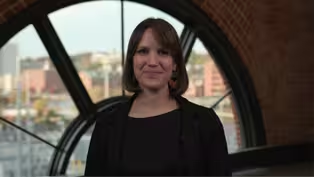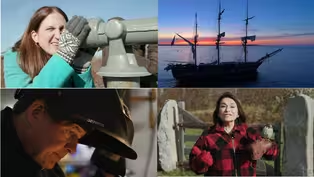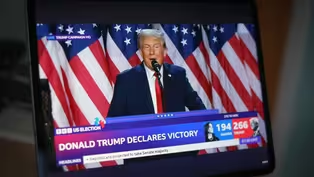
Hidden History
Clip: Season 5 Episode 45 | 11m 24sVideo has Closed Captions
Indigenous children forced to assimilate to white ways of life.
It’s called the “Hidden History” in America: Federal Indian boarding schools where indigenous children were forced to assimilate to white ways of life. The disturbing revelations and the lingering effects on the Narragansett tribe is a story that will now have the space and place to be told at the new Tomaquag Indian Memorial Museum being built in the village of Kingston.
Problems playing video? | Closed Captioning Feedback
Problems playing video? | Closed Captioning Feedback
Rhode Island PBS Weekly is a local public television program presented by Ocean State Media

Hidden History
Clip: Season 5 Episode 45 | 11m 24sVideo has Closed Captions
It’s called the “Hidden History” in America: Federal Indian boarding schools where indigenous children were forced to assimilate to white ways of life. The disturbing revelations and the lingering effects on the Narragansett tribe is a story that will now have the space and place to be told at the new Tomaquag Indian Memorial Museum being built in the village of Kingston.
Problems playing video? | Closed Captioning Feedback
How to Watch Rhode Island PBS Weekly
Rhode Island PBS Weekly is available to stream on pbs.org and the free PBS App, available on iPhone, Apple TV, Android TV, Android smartphones, Amazon Fire TV, Amazon Fire Tablet, Roku, Samsung Smart TV, and Vizio.
Providing Support for PBS.org
Learn Moreabout PBS online sponsorship(soft music) (soft music continues) - The real goal was to take the land.
If they couldn't exterminate us through genocide and warfare, they were gonna exterminate us through forced assimilation.
- [Pamela] Forced assimilation was part of a land grab tactic for early settlers, and it was an attempt by the US government to eradicate the identity of Native Americans.
In the late 1800s, little children were taken far away from home to Indian boarding schools and were routinely abused.
Many died of neglect and disease.
The practice ran for decades.
Loren Spears, known in Narragansett language as Macasuni Pashou, meaning moccasin flower, or lady slipper, is director of the Tomaquag Indian Memorial Museum, as well as a writer and educator.
- That education, on the surface, seems like a good thing, but in the case of the boarding schools, the industrial schools, the religious boarding schools that came before the federal system, these were detrimental to Indigenous children, families, and communities, and that literally they were acts of violence against the Indigenous peoples and their nations.
And the ultimate goal was to take the land, but also to strip us of our identity, our culture, our communities, our nations.
- It has been branded the Hidden History, one that is being acknowledged in exhibits such as this, held recently at the University of Rhode Island.
A poignant part of the display, these child-sized handcuffs.
When you saw these handcuffs for the first time, what went through you?
- You know, it was visceral.
Tiny children with these tiny handcuffs, and I always think of it like this.
I have a three-year-old grandson, and the idea of him being ripped from his family and community and being handcuffed in that way just is so extraordinarily painful.
- [Pamela] Spears said she first heard about Indian boarding schools from her family.
- I learned it first through our stories, through our oral histories, through the understanding that these structures were structures of slavery.
You can pretty it up with words like indentured servitude, but when people are taken as young children and never returned to your community until they're 30 or more, that's slavery.
They kept them, even during the long summer months, by putting them with white families to act as domestic help, or to do laboring jobs, and that was the way that the boarding schools actually raised money to keep these kids here.
So they've literally stolen you, and now they're forcing you to work in order to keep stealing you, and keeping you there.
- [Pamela] Spears says many Indian parents were threatened if they didn't relinquish their children or tried to hide them.
Some parents who resisted were imprisoned.
- Think about what it's like when you're a parent, and your child's been stolen from you, and you were not able to protect them.
What does that do to your heart, and to your psyche?
- [Pamela] And Spears says once their children were taken off the reservation, the cultural cleansing began.
These before and after pictures of Indigenous children reveal the process.
Native American clothing was replaced by starched Victorian dress.
The students were severely punished if they spoke their language, practiced their customs, or religion.
They were given English names.
But the first part of the transition was to cut their hair.
- Our cultural ways, your hair is like your life's blood.
It represents the past, the present, the future.
This is why this is so triggering.
It's like this overt symbol of the complete erasure of your indigeneity.
- [Pamela] This erase and replace model was first started in 1879 by Richard Pratt, a former military officer.
Among the thousands of children who were held at the Carlisle Indian Industrial School in Pennsylvania, old records indicate they were Narragansetts, as well as members of other southern New England tribes, Wampanoags, Pokanokets, and Pequots.
- One of my uncles, he's not Narragansett, he's from another tribal nation, but he was literally taken, he and his siblings, from their family and community, and he has not only the emotional scars, but the physical scars to show for it.
- [Pamela] Spears says those scars have marred the lives of Native Americans for generations.
- The violence of that theft of your childhood, the theft of your cultural knowledge, the theft of your language, and your relationships with your family and community, and how when you think of these lateral traumas today of alcoholism and drug abuse and poverty, that these are all connected.
- [Pamela] The interconnections of the story in this exhibition are too large to display in the tiny Tomaquag museum.
It has been in existence for 60 years, and is currently housed in what was once a country church deep in Exeter.
- [Loren] The idea is to re-indigenize the landscape in different kinds of ways.
- [Pamela] Now in Kingston, a new extensive museum complex will be built on 18 acres of land owned by URI.
Spears points out it is a place that has always been homeland to Narragansetts.
- All of this land that we now know as Rhode Island is Narragansett land.
We wanted it to still feel rural.
We wanted to be near water, like the Chipuxet River, and the White Horn Brook.
The campus will have four buildings, the main museum building, the education center, the Indigenous Empowerment Center, and the Archive Collections Research Center, which we'll call the Belongings Research Center.
- [Pamela] Spears also envisions gardens, hiking trails, and a replica village, where everyone is welcome to come learn.
She says education is the first step towards reconciliation.
- You know, if we wanna create equity, and undo some of the injustice that has taken place, we have to also create equity through education, we have to create equity through job training and development, we have to create equity in acknowledging and healing from the pains of the past.
- Yet the lessons of the past have not always helped heal the wounds inflicted upon Native Americans.
Spears says the Narragansett nation was detribalized in the 1800s, and not recognized until 1979.
It was a slight she felt even as a little girl.
Can you tell me what it was like for you to be a Narragansett in Rhode Island?
- There was two things happening.
When I was with my family and my community, there's such a pride and honor and respect to our culture and our community, and then it was the outside community that didn't seem to understand, so when I was in my fifth grade classroom, I had a history textbook that said I didn't exist, right there in the textbook.
So how do you, as a fifth grader, understand that?
How do you process that information?
How do you stand up for yourself?
In the classroom, it's very difficult.
My daughter is a college student now, and her first Native Studies course, the professor had them making up fictional tribes.
So there's still such a lack of understanding and a lack of knowledge, and perpetuation of stereotypes and generalizations, and just misinformation.
- Even today?
- Even today, in the 21st century.
And teachers were taught it wrong when they were in school, and they're regurgitating that misinformation and passing it forward to new generations.
And most of the time, only talking about it in the mythological sense of the quote unquote, "First Thanksgiving," as their way of bringing up indigeneity in their classrooms.
- [Pamela] Spears hope the new Tomaquag museum programs will help educate the educators.
- It gives us the opportunity to work with professors, and really build their knowledge around local Indigenous history and culture, and the intersectionality of that.
It also gives us an opportunity to work with students so that we can hopefully go forward, and this next generation isn't as misinformed as the last several generations have been.
- [Pamela] Spears believes despite the loss of family and freedom during the time of Indian boarding schools, some Native Americans still flourished by using their education and the skills they learned there.
For example, former female Sachem of the Narragansetts, Princess Red Wing, who was sent to a Quaker school.
- She was an educator and an advocate her whole life, and a culture bearer, and passing forth traditional knowledge, so she was able to, as many people that were, if you will, subjugated under the umbrella of boarding schools, in one way, was able to then take that knowledge and utilize that to support Indigenous initiatives, including speaking on behalf of Indigenous rights at the United Nations.
- [Pamela] Spears says the new Tomaquag museum will better preserve the rich history and culture of Narragansetts, including a fully fluent language.
(speaking Narragansett) It has been revived today in greetings, storytelling, and prayer.
(Loren speaking Narragansett) It translates, in part.
- Today, Creator, we come to you with a quiet heart and we give thanks for all our beloved relations.
We give thanks for those that persevered, and survived so that we could be here today.
My Take: Artificial Intelligence
Video has Closed Captions
Clip: S5 Ep45 | 5m 41s | How does ChatGPT “think”? (5m 41s)
Video has Closed Captions
Clip: S5 Ep45 | 4m 30s | A look back at stories featured on Rhode Island PBS Weekly marking 4 years on the air. (4m 30s)
Video has Closed Captions
Clip: S5 Ep45 | 2m 58s | President-elect Donald Trump gained votes in all Rhode Island communities. (2m 58s)
Providing Support for PBS.org
Learn Moreabout PBS online sponsorship
- News and Public Affairs

Top journalists deliver compelling original analysis of the hour's headlines.

- News and Public Affairs

FRONTLINE is investigative journalism that questions, explains and changes our world.












Support for PBS provided by:
Rhode Island PBS Weekly is a local public television program presented by Ocean State Media


